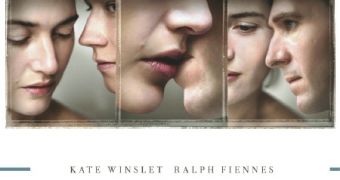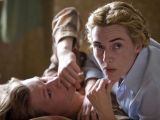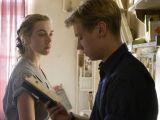“Read to me first, kid. Then we make love.” This very line, it has been said, is the only thing that moviegoers should take with them when leaving the theater after seeing “The Reader.” Director Stephen Daldry made this film not as “yet another Holocaust-movie,” not because he needed a powerful Oscar contender, and definitely not because he was looking for an excuse to present in graphic images the love affair between a woman in her mid-30s and a 15-year-old boy. Daldry made “The Reader” because he wanted viewers to look deep down into their soul and see how far they would go to hide their most shameful sins.
Laden with guilt and with an atmosphere heavy with unspoken truths that can change lives, “The Reader” presents itself as broken-down by long flashbacks and, at first sight, seemingly unrelated occurrences. Just like in life, it does not start off by explaining the whys and the hows, simply by presenting them as they happen, only to allow the viewers to later piece the story together. Albeit a bit taxing at first, soon enough “The Reader” unveils the story of a love that should not have happened in the first place, and the consequences of the choices each character makes. Again, just like in life, these are often more than our burdened soul can take.
The story begins with an enigmatic Michael Berg (Ralph Fiennes), as he coldly says his good-bye to a woman who is supposedly his lover. Without even letting the viewer take in the first minutes of the film, the action shifts to ‘50s Germany, where a young Michael (played by newcomer David Kross) gets off a tram to vomit and cry in an alley. A woman comes to ask him what’s wrong with him, and then, to take him home to his concerned parents. She is Hanna Schmitz, a 36-year-old woman so impenetrable and distant that she almost strikes one as not even remotely human. Months later, she seduces the 15-year-old Michael who comes back with flowers to thank her for her kindness when he came down with scarlet fever.
While sensual to the extreme, their love affair bespeaks of everything but love. Wrong as it might be, though, it is not the focus of the film – just like with everything else, this too simply happens and the viewers are not expected to justify it in any way, as the movie doesn’t either. The only thing that this brief, summer affair does is reveal the key to the rest of the movie, in that Hanna likes to be read more than anything else, for a reason that the film – again – refuses to present. It’s as if she’d rather spend time stripped of her clothes than of her secrecy.
The affair suddenly comes to an end, and the two will cross paths eight years later, yet under strikingly different circumstances. Michael is now a law student and, much to his surprise, he sees Hanna again on the defendant’s bench, as she’s on trial for the murder of 300 prisoners of a concentration camp, where she used to work as a guard before meeting him.
The truth becomes painful now, as also does the decision that Michael must make: revealing it would not change the fact that Hanna is guilty of war crimes, but it could possibly affect her sentence. Yet, he chooses to keep quiet and, in doing so, he deliberately makes a choice to not be good, just like Hanna also did. “The Reader” is like a game in which the characters abide by the saying of “an eye for an eye” even if it costs them what they hold most dearly. Michael admitting to his shameful sin would mean liberation for Hanna, just like she could have done the same for him once, instead of just disappearing without warning. Both choose to not do so – even if that means living in guilt and isolation for the rest of their lives.
“The Reader” has often been described as a Holocaust-themed movie, yet classifying it only as such would mean that its very message has fallen on deaf ears. Director Stephen Daldry is not preaching about good and bad with it, he’s simply turning the tables on the viewers, forcing them to look at themselves in the mirror and answer the dreadful question: what would you do to keep your most shameful secret from coming out in the open? Would you risk ridicule and losing everything, but have a guilt-free conscience, or would you go along with everything and then deal with what’s left of your life as best as you can? From what “The Reader” says, we’d all probably choose the latter because, as film critic Roger Ebert says, the most atrocious crimes in human history took place because we “just went along.”
What makes this 124-minute film so great is, undoubtedly, Kate Winslet, an actress so versatile and expressive she hardly needs to utter a word to send the message across. Newcomer Kross is clearly thrown off balance in the presence of Kate’s powerful persona but, even if with some trouble, he manages to keep up with her. Of course, that is not to say that the older Michael, played by Ralph Fiennes, is not as equally stunning in the little time he gets onscreen. Fiennes, with his usual mysterious aura and gentleman’s aloof charm, probably drew the short stick on this, it has been said, having been robbed by more time in front of the camera.
With a complicated construction, but in which the pieces fall in place in the end, and an Oscar-specific timelessness (which translates into a-seasonality and character-dependent chronology) “The Reader” could be like one’s best friend, the kind that always states the most painful truths and then waits for the viewers to react accordingly. Strangely enough, it’s the unspoken truths of the film that force them to “unlock the mystery.”
“The Reader” opened in December in select theaters in the US, reached Italy and Spain on February 13, and will conclude its run in Japan, on April 25.
The Good
The Bad
The Truth

 14 DAY TRIAL //
14 DAY TRIAL // 



